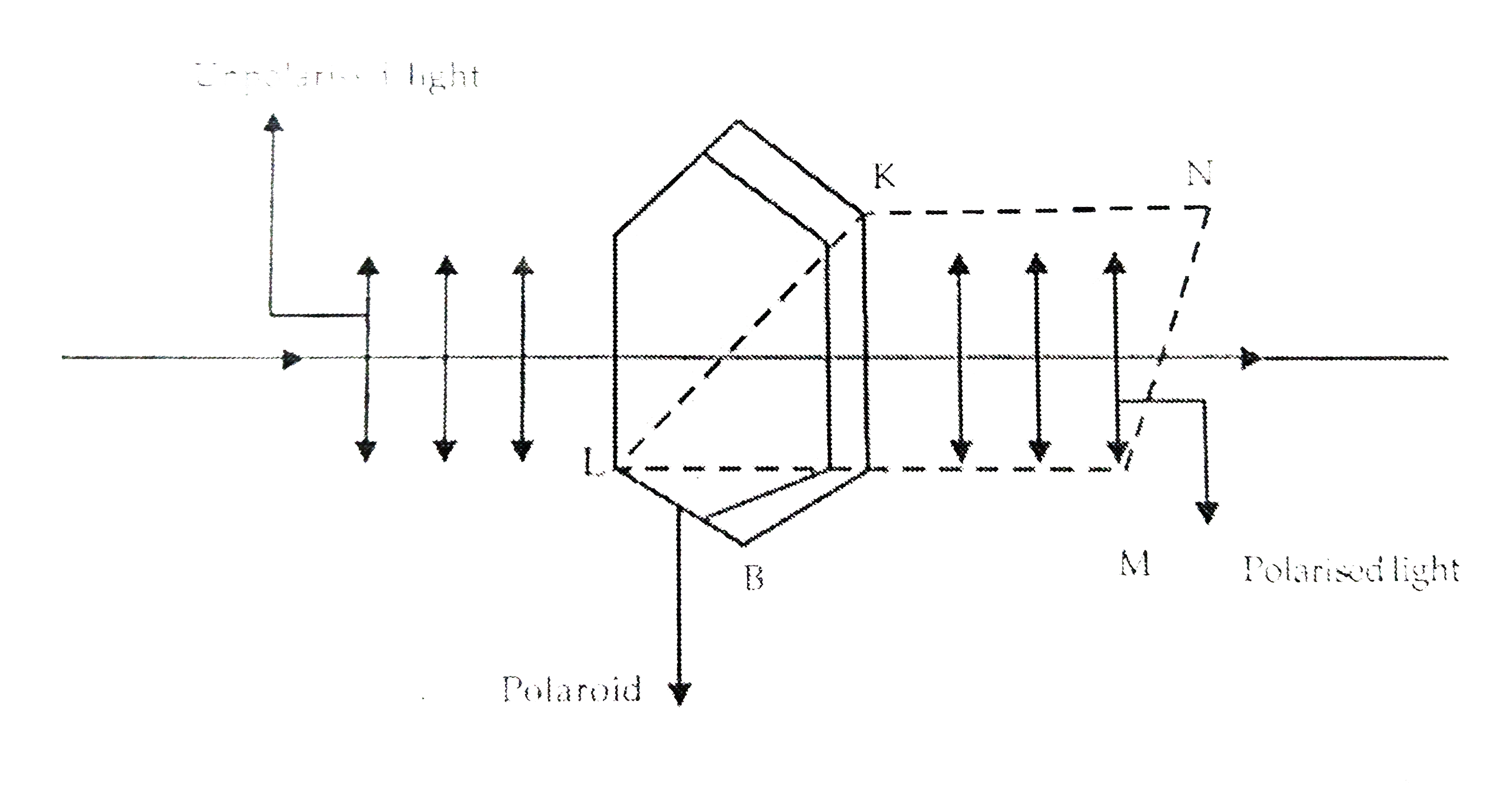(a) How does one demonstrate, using a suitable diagram, that unpolarised light when passed through a Polaroid gets polarised?
(b) A beam of unpolarised light is incident a glass-air interface. Show using a suitable ray diagram, that light reflected from the interface is totally polarised, when μ=taniB, when μ is the refractive index of glass with respect to air and iB, is the Brewster's angle.
(a) (i) Two independent monochromatic sources of light cannot produce a sustained interference patter. The phase difference between these two sources will continuously vary, and the positions of maxima and minima will change with time.
(ii) y1=acosωt,andy2=acos(ωt+ϕ)
y=y1+y2=a[cosωt+cos(ωt+ϕ)
=2acos(ϕ2)cos(ωt+ϕ2)
The resultant amplitude is A=2acos(ϕ2)
and hence intensity (I)=4a2cos2(ϕ2)=4I0cos2(ϕ2).
The intensity of light is directly proportional to the square of the amplitude of the wave. intensity of light at point P on the screen is given by :
I=4a2cos2(ϕ)2.
(a)

The phenomenon of restricting the vibration of light (electric vector) in a particular direction perpendicular to the direction of the wave propagation is called polarisation of light.
When unpolarised light is passed through a polaroid, only those bibrations of light pass through the crystal, which are parallel to the axis of the crystal (AB). All other vibrations are absorbed and that is why intensity of the emerging light is reduced.
The plane ABCD in which the vibrations of the polarise light are confined is called the plane of vibration.
The plane KLMN that is perpendicular to the plane of vibration is defined as the plane of polarization. When light is incident at Brewster angle, the reflected component OB and the refracted component OC are mutually perpendicualr to each other.
From the figure, we have:
∠BOY+∠YOC=90∘
(90∘−iB)+(90∘−r)=90∘
where, r is angle of refraction
90∘−iB=r
according to the Snell's law :
μ=sini−sinri=iBand
r=90∘−iBμ=siniBsin90∘−iB
siniBcosiBμ=taniB.
Hence, Proved.
Topper's Solved these Questions
- XII BOARDSBOOK - XII BOARDS PREVIOUS YEARCHAPTER - XII BOARDSEXERCISE - [SET - II DELHI BOARD]
6 Videos
- XII BOARDSBOOK - XII BOARDS PREVIOUS YEARCHAPTER - XII BOARDSEXERCISE - [SET - III, DELHI BOARD]
6 Videos
- XII BOARDSBOOK - XII BOARDS PREVIOUS YEARCHAPTER - XII BOARDSEXERCISE - SET - III (Delhi Board)
8 Videos
- SAMPLE PAPER 2019BOOK - XII BOARDS PREVIOUS YEARCHAPTER - SAMPLE PAPER 2019EXERCISE - SECTION D
6 Videos
Similar Questions
(a) How does one demonstrate, using a suitable diagram, that unpolarised light when passed through a Polaroid gets polarised?
(b) A beam of unpolarised light is incident a glass-air interface. Show using a suitable ray diagram, that light reflected from the interface is totally polarised, when μ=taniB, when μ is the refractive index of glass with respect to air and iB, is the Brewster's angle.
View Solution(a) How does one demonstrate, using a suitable diagram, that unpolarised light when passed through a Polaroid gets polarised?
(b) A beam of unpolarised light is incident a glass-air interface. Show using a suitable ray diagram, that light reflected from the interface is totally polarised, when μ=taniB, when μ is the refractive index of glass with respect to air and iB, is the Brewster's angle.
View Solution
Knowledge Check
A ray of unpolarised light is incident on a glass plate of refractive index 1.54 at polarising angle, then angle of refraction is :
A33∘B44∘C57∘D90∘When unpolarised light beam is incident from air onto glass (n=1.5) at the polarising angle
A(a) Reflected beam is polarised 100 percentB(b) Reflected and refracted beams are partially polarisedC(c) The reason for (a) is that almost all the light is reflectedD(d) All of the aboveAssertion (A) : When an unpolarised light is incident on a glass plate at Brewster angle, the reflected ray and refracted ray mutually perpendicular
Reason (R ) : The refractive index of glass is equal to sine of the angle of polarisation.ABoth 'A' and 'R' are true and 'R' is the correct explanation of 'A'BBoth 'A' and 'R' are true and 'R' is not the correct explanation of 'A'CA' is true and 'R' is falseDA' is false and 'R' is true
A beam of unpolarized light is incident on a glass air interface. Show, using a suitable ray diagram that light reflected from the interface is totally polarized by reflection from a transparent medium. Write expression for Brewster's angle.
View SolutionUnpolarised light is incident on a plane surface of glass of glass of refractive index n at angle i. If the reflected light gets totally polarised, write the relation between the angle i and refractive index n.
View SolutionUnpolarized light is incident on a plane surface of glass of refractive index μ at angle i. If the reflected light gets totally polarized, write the relation between the angle i and refractive index μ.
View Solution(a) What is linearly polarised light ? Describe briefly using a diagram how sunlight is polarised
(b) Unpolarised light is incident on a polaroid. How would the intensity of transmitted light change when the polaroid is rotated ?
View SolutionThe angle of incidence at which reflected light is totally polarised for reflection from air to glass (refractive index n) is
View Solution
